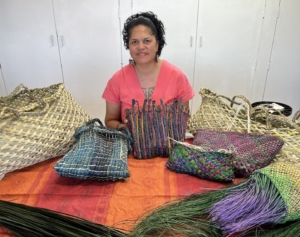
Adrienne Stewart is currently completing her Master of Creative Practice at Toihoukura, EIT’s School of Māori Visual Art and Design.
Adrienne Stewart (Te Aitanga-a-Hauiti, Te Aitanga-a-Hauiti and the Isle of Bute, Scotland) has combined her artistic expression with her desire to explore her mixed Māori and Scottish whakapapa and also further her academic career through EIT Tairāwhiti.
Adrienne’s family comes from Tolaga Bay (Uawa); however she grew up in Gisborne. To say that Adrienne comes from a creative whānau is an understatement, with her father, Adrian; her mother, Horowai; and her brother, Nepia, all accomplished artists, while her two sisters, Toni Ann and Hinetera, are both creative performing artists.
It is against this backdrop of creativity and supportive collaboration that Adrienne, 53, decided to study at Toihoukura, EIT’s School of Māori Visual Art and Design in Tairāwhiti. She completed her Bachelor of Creative Practice (Honours) last year and is currently doing her Master of Creative Practice.
The significance of her decision to study here is important as Adrienne has a long history with Toihoukura. But it was at Lytton High School where she developed her passion for art and was introduced to the work of Robyn Kahukiwa, one of Aotearoa New Zealand’s pre-eminent female Māori painters.
In 1988, after finishing school, Adrienne enrolled in a secretarial studies programme at the then Tairāwhiti Polytechnic, which is now EIT Tairāwhiti. After completing the year, she got a job in a law firm in Wellington, where she worked for a while before returning to Gisborne.
“When the new Māori Studies department established here at the Polytech, I was hired by Dr Wayne Ngata and Professor Derek Lardelli as their administrator in the early 1990s. I watched Toihoukura grow, as I was part of the establishment right from the beginning.”
In 2008 she returned to Gisborne and enrolled in the Diploma and the Bachelor of Maori Visual Arts.
“For my Master’s I had to do an exegesis, which is like a thesis, but the difference is that there’s an exhibition included, so your practical work is included within the exegesis.”
“My exegesis is about discovering one’s identity, the meaning of whānaungatanga, experimenting with different weaving techniques and materials of my mixed lineage with the ability to inform harmonious relationships of my Māori and Scottish ancestors,” says Adrienne.
“The title, setting the purpose of this project is ‘Tukutahi’ which means the synchronisation of two or more subjects or objects moving together simultaneously.”
Adrienne says the aim of her project is to demonstrate a way of expressing ‘whānaungatanga’ which means connection or relationships, through the symbolisms of her mixed lineage using rāranga or weaving.
“Whakapapa was the start of this journey and assisted in understanding the whānaungatanga process. It eventually led to historical information of my Māori and Scottish ancestry giving way to iconic symbols.”
Her postgraduate journey began a few years ago when she worked for a Māori health provider, which provides services to whānau or family who need help with mental health issues and drug addictions.
“I was looking after these families, and I noticed that a lot of our Māori whānau here were lost. They didn’t know their own identity and I realised that I didn’t know everything about what they needed when it came to the traditional ways of our tīpuna or ancestors.”
“It was a big red flag for me, and I felt, ‘oh, I need to go and learn more.’ I had to start with learning my genealogy. I already knew I had a Scottish background, but I didn’t know much about it.”
“It has been amazing because the more I learned about it, the more I understood about how similar the cultures are.”
Adrienne says that the reason she came back to Toihoukura was to use her art practice to help guide her through learning what she needed.
“Then when I got to the master’s level, I delved even more into it, and I focussed more towards the weaving.”
Adrienne’s Master’s exhibition has been set for late November 2022 at Toihoukura.
Tracey Tangihaere, Acting Head of School for Toihoukura, says Adrienne transfers her mātauranga a hapu through her art.
“Her research kaupapa is important to building knowledge on biculturalism in Aotearoa. Growing knowledge of our shared whakapapa through her research endeavours. Her work and passion, will contribute to our community and inspire others to take similar journeys.”

